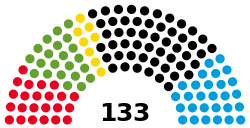This article has multiple issues. Please help improve it or discuss these issues on the talk page. (Learn how and when to remove these messages)
|
Landtag of Hesse Hessischer Landtag | |
|---|---|
| 21st Landtag of Hesse | |
 | |
| Type | |
| Type | |
| Established | 19 September 1946 |
| Leadership | |
| Structure | |
| Seats | 133 |
 | |
Political groups | Government (75)
Opposition (58) |
| Elections | |
Last election | 8 October 2023 |
| Meeting place | |
 | |
| Stadtschloss, Wiesbaden | |
| Website | |
| www | |


The Landtag of Hesse (German: Hessischer Landtag) is the unicameral parliament of the State of Hesse in the Federal Republic of Germany. It convenes in the Stadtschloss in Wiesbaden. As a legislature it is responsible for passing laws at the state level and enacting the budget. Its most important function is to elect and control the state government. The constitution of the State of Hesse describes the role of the Landtag in sections 75 to 99.
The Landtag consists of 137 members of six parties. There is a coalition between the Christian Democratic Union and the Greens. The President of the Landtag is Astrid Wallmann and the Minister-President of Hesse is Boris Rhein.
The members are elected via a mixed-member proportional representation system, with a minimum of 5% vote share to receive any seats. The smallest allowed size of Landtag is 110 members (without overhang and levelling seats), of which 55 are elected first-past-the-post in single-member constituencies and others are elected by party list vote.
In Hesse, voting in Landtag elections is available for every German citizen aged 18 or over, who has primarily resided in the state for at least three months. To stand for election, a candidate is also required to have resided in the state for at least a year.[1]
- ^ "Bürgerservice Hessenrecht". www.rv.hessenrecht.hessen.de. Retrieved 26 July 2022.